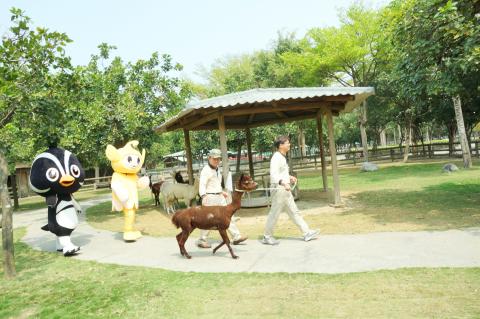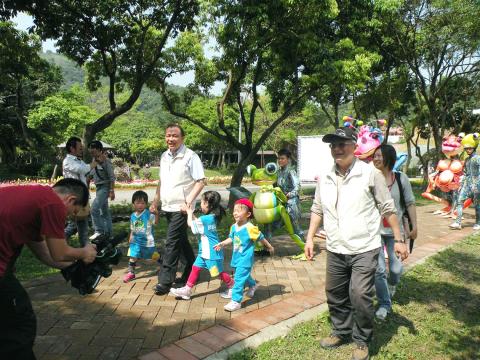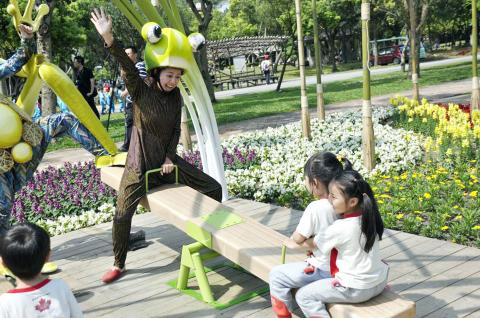The Yilan Green Expo has been taking place for over a decade and has become one of the most recognized environmental awareness activities in the country. This year, the event is back at the Wulaokeng Scenic Area (武荖坑風景區) where it will play host to a huge range of family activities for a total of 51 days. The expo, which opens tomorrow, combines tourism, food, entertainment and education in a single massive event that has greatly raised awareness of Yilan’s efforts to establish itself as a new Eden, an escape back to nature for residents of Taiwan’s overdeveloped west coast.
The 2013 Green Expo has adopted the theme of Return to the Forest, and promises visitors to Wulaokeng Scenic Area not just the beautiful scenery and warm welcome for which Yilan is already famous, but also a chance to reflect on issues such as bringing back a balance between the drive for production and the need to establish a quality of life. Finding a sustainable solution to preserving our modern lifestyles and conserving Taiwan’s increasingly threatened natural habitat tops the agenda, though you probably wouldn’t guess it from the host of fun activities, lucky draws, performances and DIY workshops to be found there.
Yilan County commissioner Lin Tsung-hsien (林聰賢) said that “natural agriculture, tourism, LOHAS lifestyle and healthy living, and experience and learning about nature” would be the keystones of this year’s event. Natural agriculture is an issue of growing importance given that Taiwan, according to a recent report based on the World Economic Forum’s Environmental Sustainability Index published by the Kuanshu Educational Foundation (觀樹教育基金會), is reported as being the heaviest user of chemical fertilizers and pesticides in the world. LOHAS is an acronym for Lifestyles of Health and Sustainability, a buzzword that has caught on in Taiwan through its linking of environmental issues with personal health. While it will take much more than Yilan’s Green Expo to change Taiwan’s agricultural habits, which for the large part continue to favor the use of chemicals to boost yields, Lin said that this year’s event, with the creation of an “organic lifestyle area,” would be an important milestone in pushing forward the policy of the “organic new Yilan.”

Photo Courtesy of the Lanyang Agricultural Development Foundation

Photo Courtesy of the Lanyang Agricultural Development Foundation

Photo Courtesy of the Lanyang Agricultural Development Foundation

Google unveiled an artificial intelligence tool Wednesday that its scientists said would help unravel the mysteries of the human genome — and could one day lead to new treatments for diseases. The deep learning model AlphaGenome was hailed by outside researchers as a “breakthrough” that would let scientists study and even simulate the roots of difficult-to-treat genetic diseases. While the first complete map of the human genome in 2003 “gave us the book of life, reading it remained a challenge,” Pushmeet Kohli, vice president of research at Google DeepMind, told journalists. “We have the text,” he said, which is a sequence of

On a harsh winter afternoon last month, 2,000 protesters marched and chanted slogans such as “CCP out” and “Korea for Koreans” in Seoul’s popular Gangnam District. Participants — mostly students — wore caps printed with the Chinese characters for “exterminate communism” (滅共) and held banners reading “Heaven will destroy the Chinese Communist Party” (天滅中共). During the march, Park Jun-young, the leader of the protest organizer “Free University,” a conservative youth movement, who was on a hunger strike, collapsed after delivering a speech in sub-zero temperatures and was later hospitalized. Several protesters shaved their heads at the end of the demonstration. A

Every now and then, even hardcore hikers like to sleep in, leave the heavy gear at home and just enjoy a relaxed half-day stroll in the mountains: no cold, no steep uphills, no pressure to walk a certain distance in a day. In the winter, the mild climate and lower elevations of the forests in Taiwan’s far south offer a number of easy escapes like this. A prime example is the river above Mudan Reservoir (牡丹水庫): with shallow water, gentle current, abundant wildlife and a complete lack of tourists, this walk is accessible to nearly everyone but still feels quite remote.

In August of 1949 American journalist Darrell Berrigan toured occupied Formosa and on Aug. 13 published “Should We Grab Formosa?” in the Saturday Evening Post. Berrigan, cataloguing the numerous horrors of corruption and looting the occupying Republic of China (ROC) was inflicting on the locals, advocated outright annexation of Taiwan by the US. He contended the islanders would welcome that. Berrigan also observed that the islanders were planning another revolt, and wrote of their “island nationalism.” The US position on Taiwan was well known there, and islanders, he said, had told him of US official statements that Taiwan had not